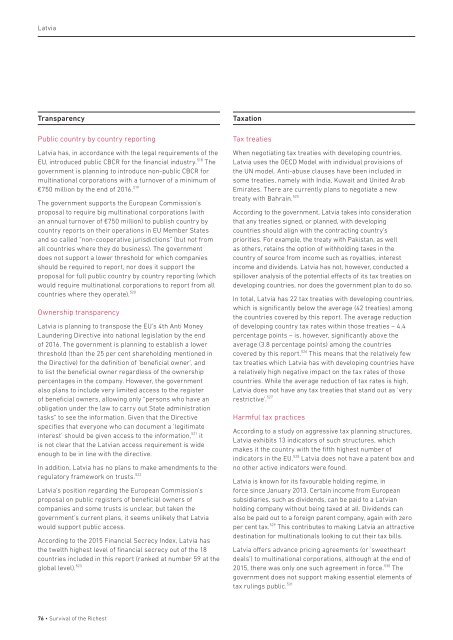Create successful ePaper yourself
Turn your PDF publications into a flip-book with our unique Google optimized e-Paper software.
Latvia<br />
Transparency<br />
Public country by country reporting<br />
Latvia has, in accordance with <strong>the</strong> legal requirements <strong>of</strong> <strong>the</strong><br />
EU, introduced public CBCR for <strong>the</strong> financial industry. 518 The<br />
government is planning to introduce non-public CBCR for<br />
multinational corporations with a turnover <strong>of</strong> a minimum <strong>of</strong><br />
€750 million by <strong>the</strong> end <strong>of</strong> 2016. 519<br />
The government supports <strong>the</strong> European Commission’s<br />
proposal to require big multinational corporations (with<br />
an annual turnover <strong>of</strong> €750 million) to publish country by<br />
country reports on <strong>the</strong>ir operations in EU Member States<br />
and so called “non-cooperative jurisdictions” (but not from<br />
all countries where <strong>the</strong>y do business). The government<br />
does not support a lower threshold for which companies<br />
should be required to report, nor does it support <strong>the</strong><br />
proposal for full public country by country reporting (which<br />
would require multinational corporations to report from all<br />
countries where <strong>the</strong>y operate). 520<br />
Ownership transparency<br />
Latvia is planning to transpose <strong>the</strong> EU’s 4th Anti Money<br />
Laundering Directive into national legislation by <strong>the</strong> end<br />
<strong>of</strong> 2016. The government is planning to establish a lower<br />
threshold (than <strong>the</strong> 25 per cent shareholding mentioned in<br />
<strong>the</strong> Directive) for <strong>the</strong> definition <strong>of</strong> ‘beneficial owner’, and<br />
to list <strong>the</strong> beneficial owner regardless <strong>of</strong> <strong>the</strong> ownership<br />
percentages in <strong>the</strong> company. However, <strong>the</strong> government<br />
also plans to include very limited access to <strong>the</strong> register<br />
<strong>of</strong> beneficial owners, allowing only “persons who have an<br />
obligation under <strong>the</strong> law to carry out State administration<br />
tasks” to see <strong>the</strong> information. Given that <strong>the</strong> Directive<br />
specifies that everyone who can document a ‘legitimate<br />
interest’ should be given access to <strong>the</strong> information, 521 it<br />
is not clear that <strong>the</strong> Latvian access requirement is wide<br />
enough to be in line with <strong>the</strong> directive.<br />
In addition, Latvia has no plans to make amendments to <strong>the</strong><br />
regulatory framework on trusts. 522<br />
Latvia’s position regarding <strong>the</strong> European Commission’s<br />
proposal on public registers <strong>of</strong> beneficial owners <strong>of</strong><br />
companies and some trusts is unclear, but taken <strong>the</strong><br />
government’s current plans, it seems unlikely that Latvia<br />
would support public access.<br />
According to <strong>the</strong> 2015 Financial Secrecy Index, Latvia has<br />
<strong>the</strong> twelth highest level <strong>of</strong> financial secrecy out <strong>of</strong> <strong>the</strong> 18<br />
countries included in this report (ranked at number 59 at <strong>the</strong><br />
global level). 523<br />
Taxation<br />
Tax treaties<br />
When negotiating tax treaties with developing countries,<br />
Latvia uses <strong>the</strong> OECD Model with individual provisions <strong>of</strong><br />
<strong>the</strong> UN model. Anti-abuse clauses have been included in<br />
some treaties, namely with India, Kuwait and United Arab<br />
Emirates. There are currently plans to negotiate a new<br />
treaty with Bahrain. 525<br />
According to <strong>the</strong> government, Latvia takes into consideration<br />
that any treaties signed, or planned, with developing<br />
countries should align with <strong>the</strong> contracting country’s<br />
priorities. For example, <strong>the</strong> treaty with Pakistan, as well<br />
as o<strong>the</strong>rs, retains <strong>the</strong> option <strong>of</strong> withholding taxes in <strong>the</strong><br />
country <strong>of</strong> source from income such as royalties, interest<br />
income and dividends. Latvia has not, however, conducted a<br />
spillover analysis <strong>of</strong> <strong>the</strong> potential effects <strong>of</strong> its tax treaties on<br />
developing countries, nor does <strong>the</strong> government plan to do so.<br />
In total, Latvia has 22 tax treaties with developing countries,<br />
which is significantly below <strong>the</strong> average (42 treaties) among<br />
<strong>the</strong> countries covered by this report. The average reduction<br />
<strong>of</strong> developing country tax rates within those treaties – 4.4<br />
percentage points – is, however, significantly above <strong>the</strong><br />
average (3.8 percentage points) among <strong>the</strong> countries<br />
covered by this report. 526 This means that <strong>the</strong> relatively few<br />
tax treaties which Latvia has with developing countries have<br />
a relatively high negative impact on <strong>the</strong> tax rates <strong>of</strong> those<br />
countries. While <strong>the</strong> average reduction <strong>of</strong> tax rates is high,<br />
Latvia does not have any tax treaties that stand out as ‘very<br />
restrictive’. 527<br />
Harmful tax practices<br />
According to a study on aggressive tax planning structures,<br />
Latvia exhibits 13 indicators <strong>of</strong> such structures, which<br />
makes it <strong>the</strong> country with <strong>the</strong> fifth highest number <strong>of</strong><br />
indicators in <strong>the</strong> EU. 528 Latvia does not have a patent box and<br />
no o<strong>the</strong>r active indicators were found.<br />
Latvia is known for its favourable holding regime, in<br />
force since January 2013. Certain income from European<br />
subsidiaries, such as dividends, can be paid to a Latvian<br />
holding company without being taxed at all. Dividends can<br />
also be paid out to a foreign parent company, again with zero<br />
per cent tax. 529 This contributes to making Latvia an attractive<br />
destination for multinationals looking to cut <strong>the</strong>ir tax bills.<br />
Latvia <strong>of</strong>fers advance pricing agreements (or ‘swee<strong>the</strong>art<br />
deals’) to multinational corporations, although at <strong>the</strong> end <strong>of</strong><br />
2015, <strong>the</strong>re was only one such agreement in force. 530 The<br />
government does not support making essential elements <strong>of</strong><br />
tax rulings public. 531<br />
76 • <strong>Survival</strong> <strong>of</strong> <strong>the</strong> <strong>Richest</strong>


